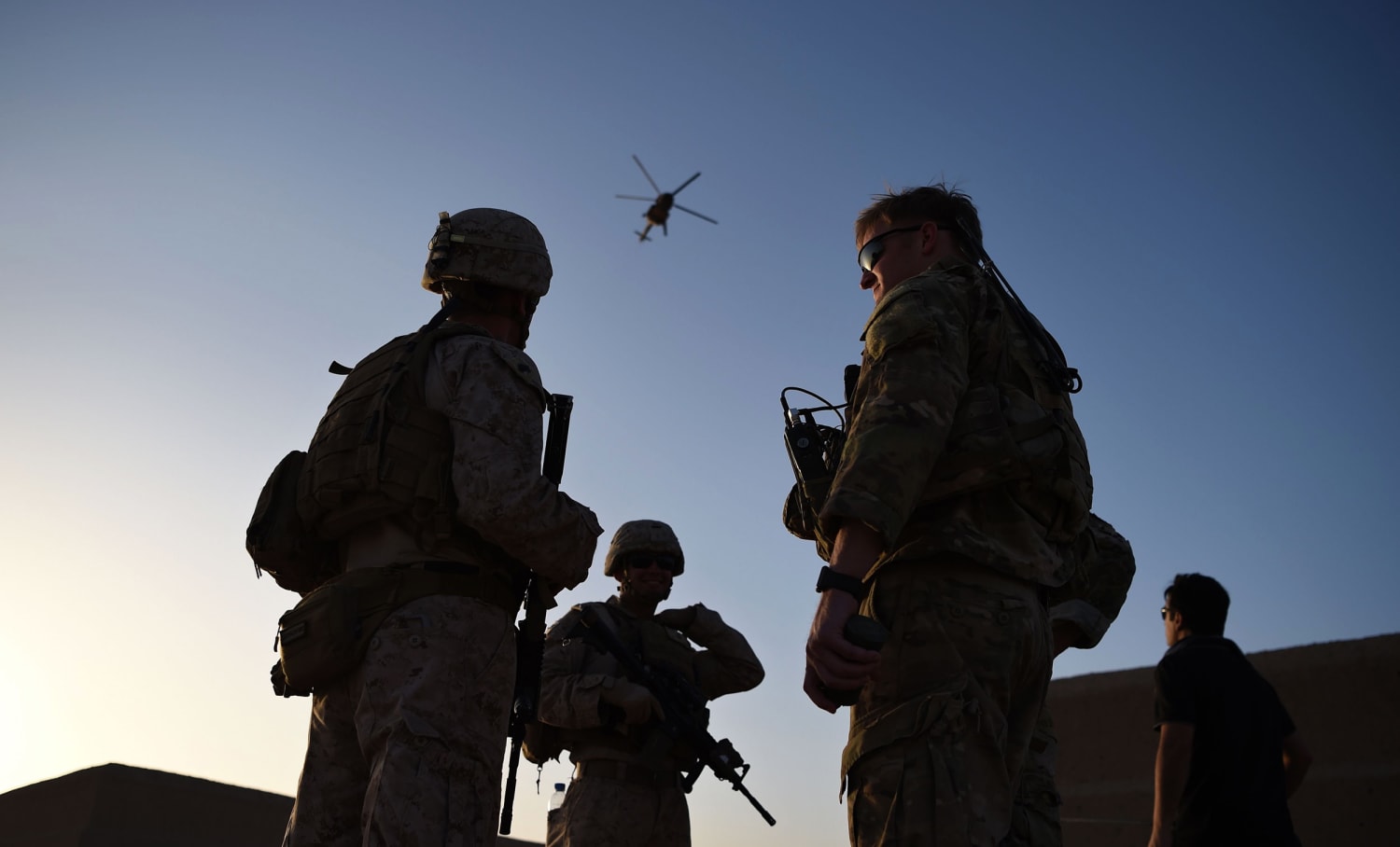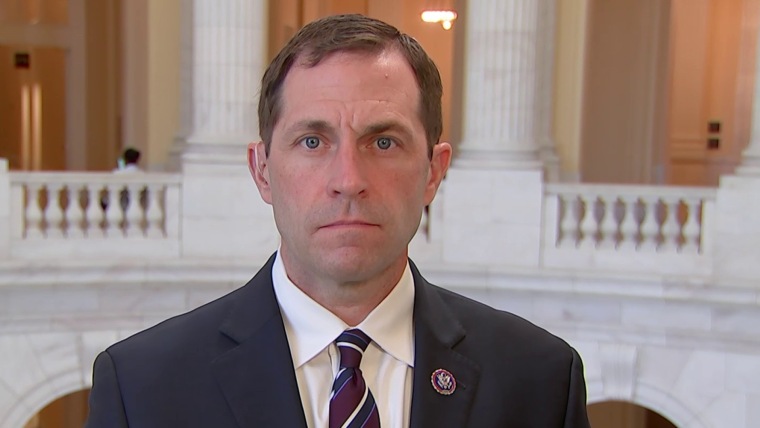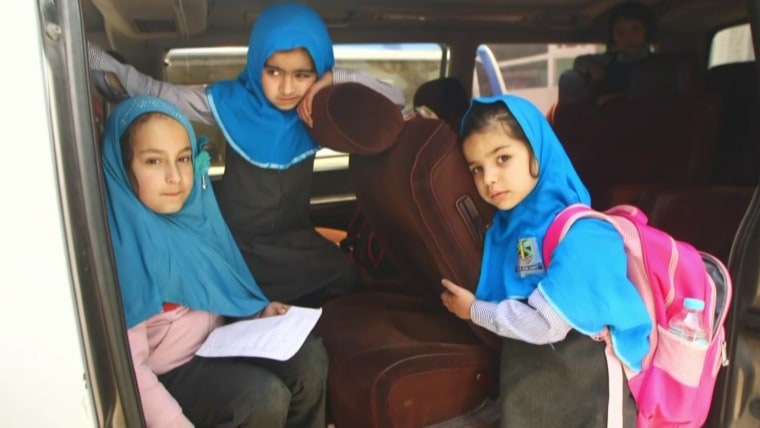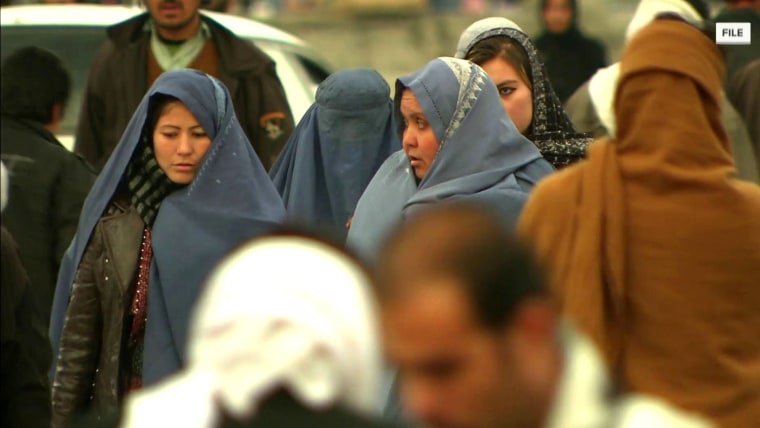WASHINGTON — The window for a possible evacuation of Afghans who worked for the U.S. could soon close as a withdrawal of U.S. forces will likely wrap up within weeks, two Defense officials told NBC News.
The Pentagon is preparing contingency plans for a potential evacuation of Afghans who worked with American troops but President Joe Biden has yet to give the order to carry them out. U.S. forces are expected to pull out as early as mid-July, the two officials said.
Rep. Jason Crow, D.-Colo., an outspoken advocate of evacuating Afghan partners, said, “We don’t have much time to do it. And we’re about 50 percent complete with the withdrawal.”
“After that’s completed, our ability to safely evacuate folks will be greatly diminished,” Crow told NBC News.
The State Department told NBC News it has been planning for the possibility of Afghans fleeing to surrounding countries, and has spoken to those countries about being ready to receive them.
Biden vowed in April to withdraw U.S. troops from Afghanistan by Sept. 11. The scheduled departure has gained pace in recent weeks, with the withdrawal of personnel and equipment now at the halfway point, according to U.S. Central Command.
As of Wednesday, U.S. commanders had handed over six facilities to Afghan government forces. Soon, American troops will leave their main airfield in Bagram, which would likely serve as a hub for any evacuation. The U.S. military last month pulled out of a major airbase in southern Afghanistan at Kandahar.
With the Sept. 11 deadline looming, members of Congress, veterans groups and refugee advocates are pressing for an emergency evacuation of thousands of Afghan partners who have applied for U.S. visas.
Rep. Crow is part of a bipartisan group of lawmakers pushing for action to protect Afghans who worked for U.S. troops and diplomats.
“There is no doubt in our mind that many of them will be killed, unless we protect them. That is what’s at stake here,” he said.
Deputy Secretary of State Brian McKeon briefed Crow and other lawmakers on the plight of Afghan partners on Tuesday.
A defense official said the military has prepared contingency plans for evacuating thousands of Afghans who helped the coalition, but stressed that U.S. Central Command has no orders to carry them out. The official said they could implement the plans very quickly if called to do so.
Asked about contingency plans, Pentagon spokesperson John Kirby said in an email: “While there is no tasking to evacuate Afghans at this time, we have that capability and the (Defense) Secretary is confident that we would be able to execute it if necessary.”
Advocates for an urgent evacuation argue that organizing such an operation after U.S. troops leave would be more dangerous, more expensive and politically more complicated. Drones and intelligence resources will be gone and the security situation at air bases will be uncertain.
The United States has no agreements in place with neighboring countries in Central Asia that would allow it to launch aircraft just across the border. Instead, U.S. forces would have to rely on bases located farther away in Persian Gulf, including in Bahrain, the United Arab Emirates and Kuwait.
Without U.S. or NATO troops and aircraft on the ground, sending in planes to pick up endangered Afghans would require securing at least one airfield, which could prove daunting given the steady advance of the Taliban in recent months against the Afghan government. Moreover, under the 2020 U.S.-Taliban deal negotiated by Trump officials, the United States committed to a permanent removal of American troops and the insurgents would likely view an evacuation operation as a clear violation of the agreement.
When the United States evacuated more than 6,000 Iraqi Kurds in 1996 from northern Iraq in the face of an offensive by Saddam Hussein’s regime, U.S. forces were on the ground, according to Chris Purdy, project manager at Veterans for American Ideals.
“Right now, we are rapidly approaching the point in which there will be little security left in Afghanistan to support a withdrawal,” Purdy said. “Every day that passes means that we will be forced to make more hard decisions. We don’t have a year or six months to plan every detail, we have weeks and days.”
Lawmakers asked Secretary of State Antony Blinken at a hearing Monday if the administration was ready to evacuate Afghan partners. Blinken did not directly answer but said: “We’re considering every option.”
About 18,000 Afghans have applied for visas under the Special Immigrant Visa program set up in 2009 for those who worked for the U.S. government in Afghanistan. But the program has a years-long backlog.
The State Department says it is adding 50 extra staff and taking other steps to speed up the processing of SIV applications.
“While we remain focused on the peace process, we also have a commitment to Afghans who served the U.S. government at great personal risk to themselves and their families, and we are processing qualified SIV applications as quickly as we possibly can,” a State Department spokesperson said.
U.S. officials also are asking neighboring governments to be ready to accept refugees from Afghanistan if the country slides into chaos, the spokesperson said.
“We call on neighboring countries to keep their borders open to those seeking international protection and will continue to provide humanitarian assistance to existing and new Afghan refugees and host communities,” the spokesperson said.
“Our goal is to ensure Afghans can seek international protection if they need to.”
The spokesperson said “extensive planning has been underway for many months” for a possible rise in displaced Afghans due to a number of reasons, including drought, the Covid-19 pandemic and the ongoing conflict between the Taliban and the Afghan government.
Deputy Secretary of State Brian McKeon briefed lawmakers on Tuesday on the effort.
Rep. Michael McCaul of Texas, the ranking Republican member on the House Foreign Affairs Committee, told Secretary of State Blinken at Monday’s hearing that there was not enough time to process visa applications before U.S. troops depart between now and Sept. 11.
“That means these people will have a bull’s-eye and a target on their back from the moment we leave the country,” McCaul said.
Crow said it was up to President Biden if the evacuation goes ahead or not.
“It’s obviously very clear that that order has to come from the White House. That policy shift has to come from the White House,” he said.
Source: | This article originally belongs to Nbcnews.com













